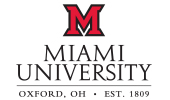
Using Technology to Create an Inclusive and Accessible Environment
Challenge
As universities increasingly rely on web-based, digital, and emerging technologies, Miami University made the commitment to provide qualified individuals with disabilities an equal opportunity to participate in and benefit from campus-wide services, programs and activities.
Actions
In 2011, the Accessible Technology Committee (ATC) was formed. Membership consists of various university stakeholders and partners who explore, research, and implement adaptive technology initiatives and policy. Subsequently, an Office for Accessible Technology Services was created to review and test applications, websites, and documents, and to provides training and captioning support services. There is a dedicated staff that includes an AccessMU Center with physical space for production, training and self-service resources. A Faculty Learning Community (FLC) was established to review and discuss best practices for creating an inclusive learning environment, examine their current courses, and identify opportunities to improve accessibility.
Outcomes
Student Disability Services (SDS) currently serves more than 1,400 students, which is approximately 8.2% of the student body. In 2015, SDS introduced their electronic case management system called Students Accessing Miami (SAM). Students can apply for services; schedule meetings with SDS staff; navigate and notify faculty of their accommodations, and access services at any time. Faculty and staff can attend an annual Accessible Technology Symposium and discuss current issues and trends in accessible technology, and provide information about universal design and building accessible content for classroom and marketing materials. The university also incorporates accessibility training into its new employee faculty orientation.
Contact
Sean Poley
Quote
Our commitment to diversity drives us to remove barriers of any kind to full participation in our community. Improving access for 1,400 of our students not only benefits them – it benefits all of us by elevating our level of engagement with each other.